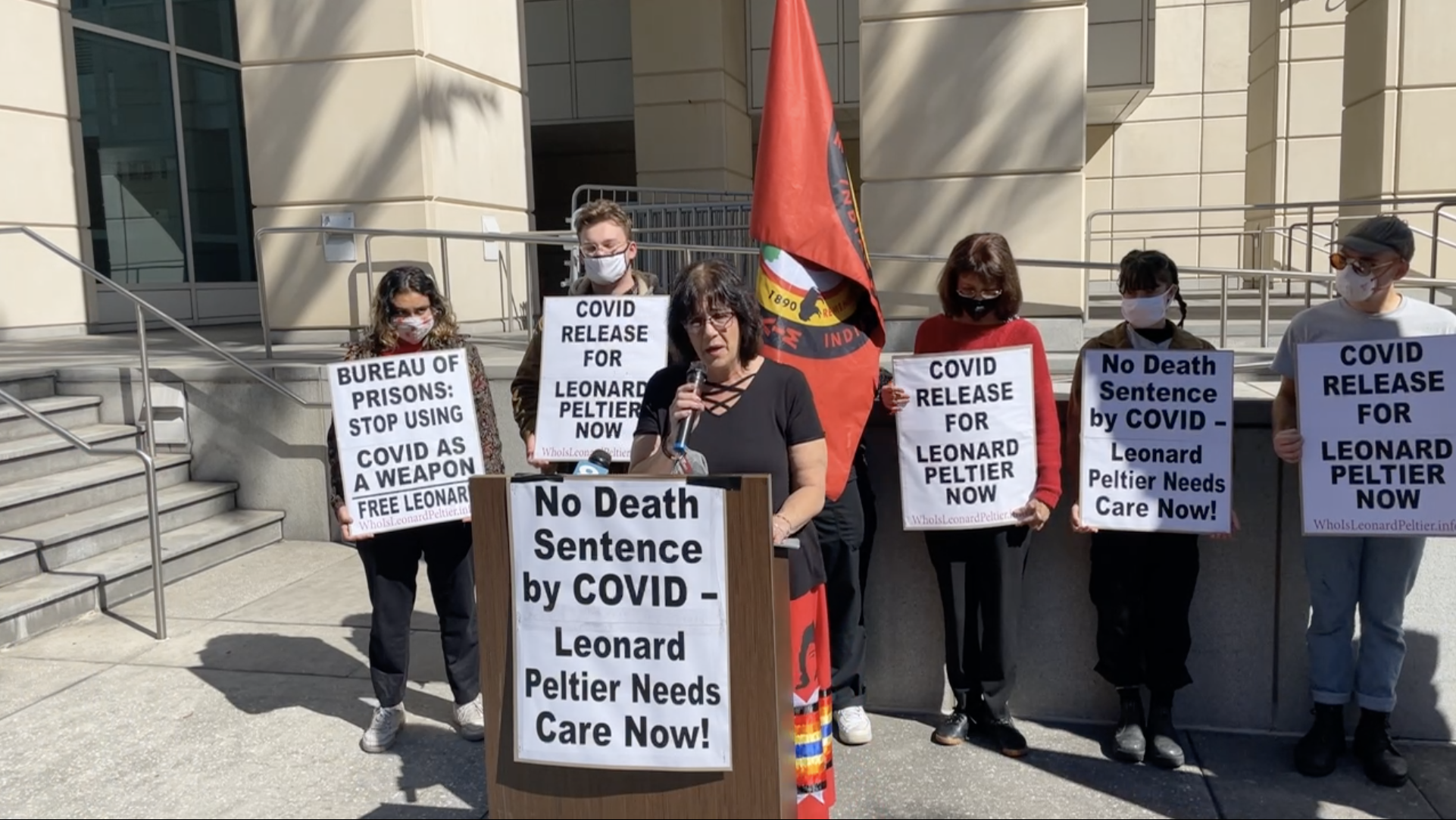
- Details
- By Darren Thompson
Earlier today, the International Leonard Peltier Defense Committee (ILPDC) hosted a press conference outside the Sam Gibbons United States Courthouse in Tampa, Florida, demanding that he be immediately released to either a more adequate facility or home. Peltier was diagnosed with COVID-19 on Friday and is currently in the maximum security prison facility in Coleman, Florida.
“On Friday morning, I spoke with Leonard on the phone and he was stressed. He had been sick all night long, he was coughing and could hardly breathe,” said ILPDC co-director Carol Gokee during a press conference.
Gokee updated the public on Peltier’s status, including that Peltier was in isolation for 14 days and that if conditions worsen, he’ll be transferred to a hospital. She also shared that she asked Peltier how he thinks he may have caught the virus. She says he reported to her the prison guards weren’t wearing masks.
Want more Native News? Get the free daily newsletter today.
Peltier, 77, is Anishinaabe, an enrolled member of the Turtle Mountain Reservation in North Dakota, and Lakota. Peltier has spent more than 46 years in federal prison for the conviction of the murders of two FBI agents on the Pine Ridge Indian Reservation in 1975. Peltier’s conviction has been challenged for decades by lawyers, organizations, politicians, and former judges. He suffers from kidney disease, high blood pressure, and diabetes, and his health has been a concern of supporters for years.
“If Leonard Peltier dies in prison, God help us,” said Gokee.
ILPDC’s co-director, Jean Roach, a survivor of the FBI shootout that left three dead in, spoke of the genocide of Native people and what she said are “double standards” that Native people have to live through. “We’re tired of the genocide,” Roach said during Monday’s press conference.
A long-time advocate for Peltier’s release, she spoke to the public of the federal government’s treatment of Native people by reminding those in attendance of the murders of some of Indian Country’s most renowned leaders.
“A long time ago, they killed our leaders Sitting Bull, Crazy Horse, and also put them in prison,” said Roach. “They’re doing the same thing to Leonard Peltier.”
Roach also spoke of the effects COVID-19 has had on Native communities. “The numbers for COVID are high for our people,” she said. “We want Leonard in a hospital immediately.”
Others have taken actions since they have heard of Peltier’s positive COVID-19 case on Friday.
“As Native people and public servants, we understand fully the sense of urgency our loved ones are faced with regarding COVID,” said North Dakota Representative Ruth Buffalo to Native News Online. “Add inhumane living conditions, and prison guards who don’t follow CDC guidelines, it is a recipe for disaster.”
Buffalo, a member of the Three Affiliated Tribes in North Dakota, is the first Native American woman elected to the North Dakota House of Representatives and currently the Vice Chair of the National Caucus of Native American State Legislators. On Monday, she organized a letter asking for the immediate release of Leonard Peltier to President Biden, U.S. Attorney General Merrick Garland, Director of Federal Bureau of Prison Michael Carvajan, and Southeast Regional Director of the Bureau of Prisons J.A. Keller..
“We request that Mr. Peltier be immediately released to serve the remainder of his sentence in extended home confinement or hospital care, recognizing the increased infectivity of the Omicron variant among the general and incarcerated populace,” said the National Caucus of Native American State Legislators letter on Monday.
Two days ago, the ILPDC started a petition on change.org asking for signatures supporting to hospitalize Leonard Peltier and to demand President Joe Biden grant Peltier clemency. As of this press time, more than 3,300 people have signed the petition asking for Peltier’s release.
“Even if Mr. Peltier had not been convicted under contested circumstances, his advanced age, ill health and the amount of time he’s served ought to be enough to reconsider his circumstances,” said Buffalo of Peltier. “We are beyond the stage of making an example, and sheer human compassion and clemency urgently needs to be considered. Continued imprisonment is surely a death sentence.”
More Stories Like This
Native News Weekly (August 25, 2024): D.C. BriefsNavajo Nation Mourns the Passing of Former Vice President Rex Lee Jim
Deb Haaland Earns Endorsement From Communications Workers of America Local 7076
University Soccer Standout Leads by Example
Two Native Americans Named to Democratic Congressional Campaign Committee's“Red to Blue” Program
Help us defend tribal sovereignty.
At Native News Online, our mission is rooted in telling the stories that strengthen sovereignty and uplift Indigenous voices — not just at year’s end, but every single day.
Because of your generosity last year, we were able to keep our reporters on the ground in tribal communities, at national gatherings and in the halls of Congress — covering the issues that matter most to Indian Country: sovereignty, culture, education, health and economic opportunity.
That support sustained us through a tough year in 2025. Now, as we look to the year ahead, we need your help right now to ensure warrior journalism remains strong — reporting that defends tribal sovereignty, amplifies Native truth, and holds power accountable.
 The stakes couldn't be higher. Your support keeps Native voices heard, Native stories told and Native sovereignty defended.
The stakes couldn't be higher. Your support keeps Native voices heard, Native stories told and Native sovereignty defended.
Stand with Warrior Journalism today.
Levi Rickert (Potawatomi), Editor & Publisher
